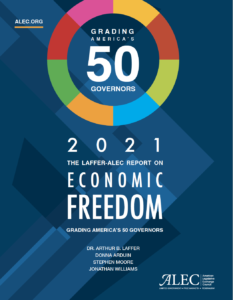Federalism
Key Points
- Article V of the U.S. Constitution provides for the states to call an Amendments Convention when the federal government exceeds its constitutional authority. Amendments to limit the government’s power, including a Balanced Budget Amendment to the U.S. Constitution, would help to check federal overreach.
- More than 50 percent of territory from Colorado westward is managed by the federal government despite evidence that the states would serve as superior environmental and economic stewards of the land. Western states that petition for control of select federal lands within their borders should receive it as control over the land inside its boundaries is state sovereignty at its most basic. National parks and monuments, military installations, Congressionally-designated wilderness areas and tribal lands would be excluded from transfers.
- Unfunded federal mandates are inconsistent with federalism, which was based on cooperation, not compulsion and the regulations that often accompany unfunded mandates impose obligations on state governments resulting in unsustainable costs and inefficiencies.
Genuine accountability to hardworking taxpayers results when state and local legislators work with members of the community to determine a plan of action that is right for each individual state, city or town. Real solutions to America’s challenges can be found in the states – America’s fifty laboratories of democracy – not in one-size fits all federal government policies that disregard regional differences and local community needs. The Tenth Amendment to the U.S. Constitution encapsulates these ideas and serves as the Constitutional linchpin for federalism, one of ALEC’s three guiding principles.
“The powers not delegated to the United States by the Constitution, nor prohibited by it to the states, are reserved to the states respectively, or to the people.”
America has drifted away from our Founding Fathers’ vision and has concentrated more power with national government structures. The amassing of power with the federal government has led to overregulation and redundant bureaucracy hindering economic growth and free markets; a ballooning national debt that threatens U.S. security and federal mismanagement of this nation’s most precious resource – the lands within America’s borders. The solution to restoring the balance between the federal and state and local governments is to return control over matters that more appropriately and constitutionally rest with the states and municipalities back to them. There are some obvious examples of federal overreach where reform is needed.
Model Policies
-
Safeguard American Votes and Elections Act (SAVE Act) Final
(1) In all elections, including primary elections, for any local, state, or federal public office, the following shall be prohibited: a. Voting systems that permit a voter to vote for more than one candidate for the same office; b. Voting systems that permit a voter to…
-
Act to Ensure US Amendments Ratified by Article V State Conventions are a Vote of “We the People” Final
An act to ensure that all Amendments added to the US Constitution by State Conventions are “an explicit and authentic act of the whole people.” Be It Enacted by the Legislature of the State of {STATE}: Section 1. Whenever the Congress of the United States or an Article…
-
Article V Application for a Federal Fiscal Responsibility Amendments Convention to Curb Runaway Inflation and Restore Fiscal Sanity Final
TO MAKE APPLICATION FOR AN INFLATION-FIGHTING, FEDERAL FISCAL RESPONSIBILITY AMENDMENTS (FRA) CONVENTION; TO DEMAND CONGRESS EXPEDITIOUSLY PASS A RESOLUTION DIRECTING THE ARCHIVIST OF THE UNITED STATES TO TRACK AND MAKE PUBLIC A LIST OF APPLICATIONS, AND STIPULATING RATIFICATION BY A VOTE OF THE PEOPLE IN STATE CONVENTIONS. Whereas, Article V…
-
Executive Review Process Amendments Final
Be it enacted by the State Legislature: Section 1. (1) The [Constitutional Defense Council, the State Attorney General, the Governor or other relevant entity] shall review certain executive orders by the President of the United States that are not affirmed by a vote of the United States Congress and signed…
-
An Act to Facilitate the Disclosure of Foreign Grants or Gifts Received by State Agencies Final
Model Policy Section I. Short Title. This Act may be cited as the “Public Transparency on Foreign Grants and Gifts Act.” Section II. Preamble. WHEREAS, globalization has increased the number of interactions between foreign governments and state agencies; and WHEREAS, these interactions often involve highly sensitive technological research initiatives…
-
Resolutions Urging US Universities to Relocate Chinese Language Programs from Mainland China to Taiwan Final
Model Policy WHEREAS, students benefit enormously from overseas educational programs that promote cultural and language learning and these benefits are typically realized by the students’ home countries; and WHEREAS, the People’s Republic of China (PRC) is an American top three trading partner and is a global economic and strategic power;…
Press Releases
-

ALEC Educating States on How to Address Federal Dysfunction
Arlington, Va. (March 20, 2023) – The American Legislative Exchange Council’s (ALEC) Center to Restore the Balance of Government today released a series of educational videos to educate state lawmakers…
-

Supreme Court Returns Abortion Decision ‘to the people’
Court empowers state legislatures with authority to decide what is best for citizens of their state Arlington, Va. – The American Legislative Exchange Council (ALEC) CEO Lisa B. Nelson today…
-

ALEC Applauds SCOTUS Decision Upholding States’ Rights in Berger v. NC NAACP Case
Decision upholds the Constitutional right of state legislatures to defend their laws as they see fit Arlington, Va. – The American Legislative Exchange Council (ALEC)…
-
ALEC Scholar Dr. Arthur Laffer Receives Presidential Medal of Freedom
FOR IMMEDIATE RELEASE Contact: Daniel Reynolds dreynolds@alec.org ALEC Scholar Dr. Arthur Laffer Receives Presidential Medal of Freedom Sound economics recognized by the President…
-
State Legislator Leaders, Members of Congress and Policy Experts To Meet in Nation’s Capital To Discuss an Article V Amendments Convention
State legislators are on Capitol Hill today hosting a panel discussion with Members of Congress and policy experts to explore what an Article V Amendments Convention would look like if states meet the threshold for calling a convention.
-
ALEC Urges President and Federal Government to Consult with States on Energy Resources and Public Lands
FOR IMMEDIATE RELEASE Contact: Kaitlyn Buss Phone: 202-742-8526 Email: kbuss@alec.org ALEC Urges President and Federal Government to Consult with States on Energy Resources and Public Lands…







